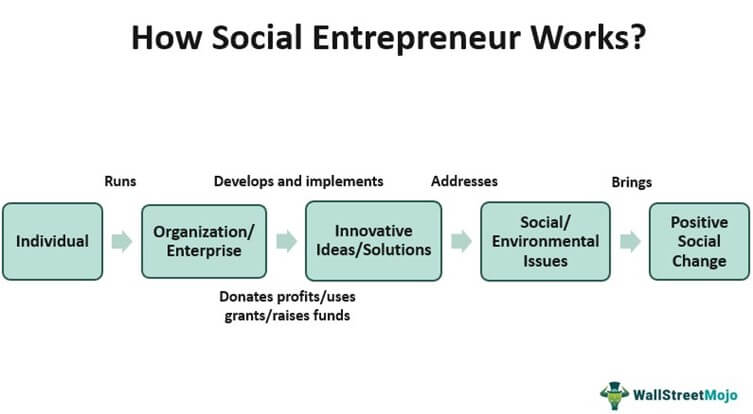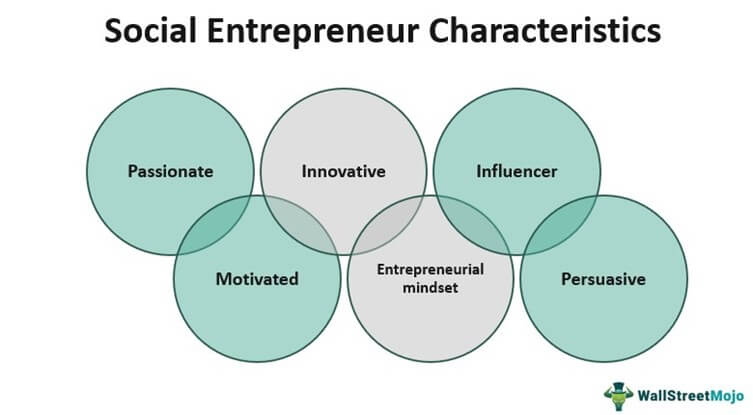Social Entrepreneur
Publication Date :
20 Aug, 2021
Blog Author :
Edited by :
Reviewed by :
Share
Table Of Contents
Key Takeaways
- Social entrepreneur refers to a person who runs a business or organization intending to tackle social issues and bring about social change through innovative solutions.
- They take initiatives for social satisfaction and show lesser interest in profit-making.
- These entrepreneurs might be for-profit or non-profit, and they operate under the umbrella of social enterprise or entrepreneurship.
- It recognizes societal issues, donates profits or uses grants or raises, and mobilizes resources for the greater good.
- Poverty reduction, child rights restoration, access to health care and financial services, women empowerment, and community development are the most common issues these entrepreneurs address.
- They often persuade societies, large organizations, and governments to encourage social transformation by addressing unmet needs and social issues.
How Does Social Entrepreneurship Work?
Social entrepreneurs strive to develop and implement innovative and long-term solutions to social, cultural, financial, and environmental problems. Either, they donate their profits, earned from selling goods and services, to aid those in need. Or, they use government grants or raise funds to support a cause. In other words, these entrepreneurs can be for both profit and non-profit purposes and operate under social enterprises. However, their primary goal is to effect social change while earning a profit to further the social cause.

American economist H. Bowen coined the words "social entrepreneur" and "social entrepreneurship" in his book "Social Responsibilities of the Businessman," published in 1953. Its definition relates to organizations having a better understanding of societal concerns and mobilizing resources for the common good. However, the concept became popular in the 1980s.
Individuals engaged in social enterprises remain more concerned with improving society than with making money. The two common approaches they follow include socially responsible investing (SRI) and environmental, social, and governance (ESG) investing. The fundamental challenges that it usually addresses are poverty alleviation, child rights restoration, health care accessibility, women empowerment, community development, etc.
Though most often associated with or functioning as a non-profit, social enterprises take risks to bring a positive social change while generating social capital to serve the purpose. It proposes user-friendly, innovative solutions to prevalent societal issues through its initiatives. Some notable entities involved in such activities include Schwab Foundation for Social Entrepreneurship, Toms Shoes, NIKA Water Co., Echoing Green, etc.
Social Entrepreneur Examples
Let us look at some real-life social entrepreneur examples:
Example #1
Rebecca, a business graduate, notices a dozen of homeless in her neighborhood whom she wants to help. Being an aspiring businesswoman and a compassionate human being, she comes up with an innovative idea of fulfilling her dream and goal. Rebecca opens a cafeteria downtown and employs those homeless persons.
Running a business helps Rebecca make money that she can use to expand her café and support social causes. Most importantly, she can contribute to the greater good of society by employing poor people, which improves their well-being. Thus, Rebecca's café becomes a social enterprise that brings a positive change in society.
Example #2
In 2020, the COVID-19 pandemic wreaked havoc on the global economy. However, social enterprises saw this as an opportunity to shift their business strategy and progress toward a circular economy. Their swift response in the face of health and financial crises aided the recovery of disadvantaged communities and enterprises.
Social companies made a significant contribution in several areas, including economic resilience, healthcare, education, and remote working. They made a difference in people's lives in many ways.
These entrepreneurs came up with innovative solutions, such as the medicine-on-wheels service by Kaaro Health in Uganda. Other notable social works include Estrafalario employing poor women to make handcrafted recycled masks, The Hive Bulk Foods recycling plastic packaging waste, and CheckUps Medical providing remote healthcare services.
Types Of Social Entrepreneurship
Social enterprise usually has four main categories based on type, mission, target audience, and approach. However, many new ideas are becoming more popular with time.
#1 - Trading Enterprises
These are cooperatives, collectives, and other organizations co-owned by workers or employees. Compared to other business models, joint ownership allows for improved efficiency, profitability, and revenue.
#2 - Financial Institutions
These are member-owned institutions, such as cooperative banks, credit unions, and revolving loan funds. Credit unions are member-owned financial cooperatives using deposited funds to benefit their members, and non-profits offering high savings rates and low-interest rates on loans. Thus, they serve as a secure place to save and borrow at competitive rates.
Cooperative banks offer an array of financial services, and their customers are their owners. They even provide services like savings and loans to non-members. Also, some cooperative banks trade bonds and equities on public stock exchanges.
#3 - NGOs And Charities
These organizations operate both on local and global scales to improve issues related to the environment, society, activism, and human rights. Non-governmental organizations (NGOs) undertake various service and humanitarian roles, advocate for and monitor policies, and foster political participation, bringing citizen concerns to governments.
#4 - Community-Oriented Organizations
These are the organizations that work to improve the development of territories and communities. Their members believe in the mission of the organization. They often seek to reinvest revenues back into the community.
Social Entrepreneur Characteristics
Here are some common social entrepreneur characteristics that define their works and objectives:

- Passionate For Social Change - They are passionate about their ideas and projects to achieve social change. Also, they address social issues to improve the lives of disadvantaged people within communities.
- Innovative Solutions - They identify and solve social, financial, and environmental problems using effective solutions. Besides, they practice innovative approaches to address public issues and bring positive change in society.
- Self-Supportive & Financially Sustainable - They do not depend on government subsidies to survive and generate capital to further the social cause. However, their primary focus remains to maximize social satisfaction.
- Scaling Improvement - They primarily focus on expanding the scope of their actions to increase their social influence. As a result, they persuade societies, large corporations, and governments to support social entrepreneur ideas of social transformation.
- Entrepreneurial Approach - They identify market possibilities, gather resources, develop creative solutions, and have a long-term impact on society. Also, they use feedback to improve their performance and stay persistent in their efforts to meet.

Social Entrepreneur Meaning
Social enterprise or entrepreneurship enables entrepreneurs to combine commerce with social and environmental issues to improve community well-being. Their work areas include microfinance, education, health, and sanitation, among others. These entrepreneurs persuade communities, large corporations, and governments to promote social transformation and growth in addition to alleviating unmet needs and social problems within communities.